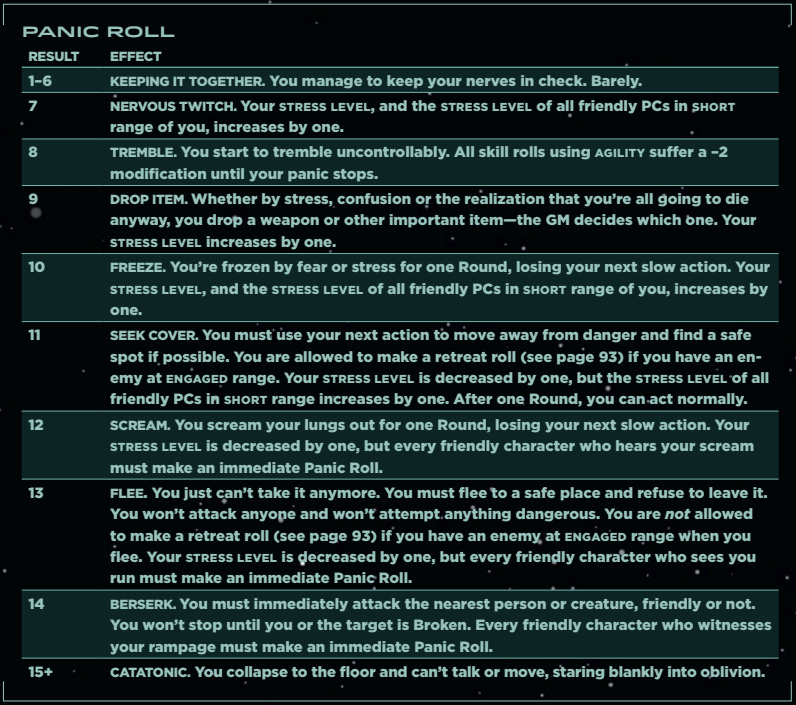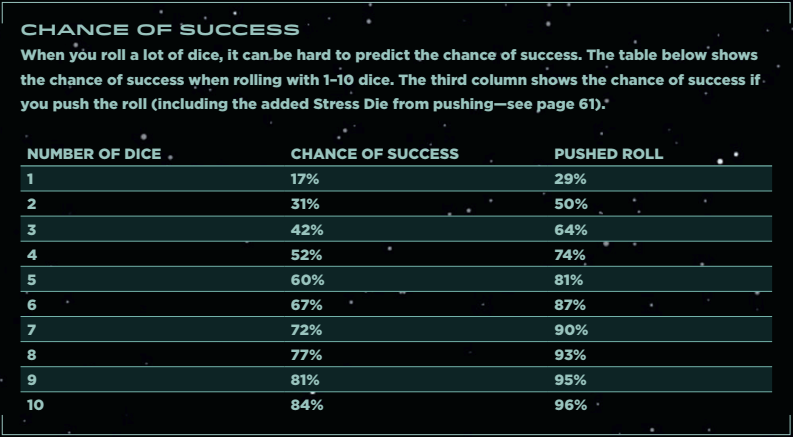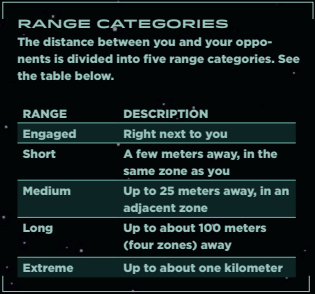Stress & Panic:
The mounting tension in your character is measured by their STRESS LEVEL. It usually starts at zero, and increases
during the course of the game. Your STRESS LEVEL increases by one whenever one of the following happens:
-You push a skill roll.
-You fire a burst of full-auto fire.
-You suffer one or more points of damage.
-You go without sleep, food, or water.
-You perform a coup de gras.
-A Scientist in your team fails to use the Analysis talent.
-A member of your own crew attacks you.
-A person nearby is revealed to be an android.
-You encounter certain creatures or locations as determined by the scenario or GM.
Gaining STRESS DICE:
Whenever you make a skill roll, you must add a number of STRESS DICE equal to your current STRESS LEVEL to your roll.
Your stress makes you more focused, increasing your chance to succeed. There's a flip side to this though. If you
roll one or more 1s (ones) on your STRESS DICE, you must make a PANIC ROLL.
Panic Roll:
As long as you keep your stress in check, you can use it to your advantage. But if the tension grows too strong, it
can explode, sending you into a wild panic. You need to make a PANIC ROLL when any of the following happens:
-You roll one or more 1s (ones) on your STRESS DICE during a skill roll. If this happens, you can't push the roll.
Instead, roll for panic.
-You witness a friendly character suffering from a certain panic effect.
-You are pinned down by a ranged attack.
-You suffer a critical injury.
-You are attacked by a strange alien creature you've never seen before.
-A truly horrifying event occurs, as determined by a scenario or the GM.
Resolution:
Roll a D6, add your current STRESS LEVEL and check the panic table.
Panic Table:
 Stopping Panic:
Stopping Panic:
Some effects on the PANIC ROLL table are immediate or last one ROUND. Others remain in effect until one of the following
happens:
-Another character comes to your aid and makes a COMMAND roll. This counts as a slow action in combat.
-You are BROKEN.
-One TURN passes.
Relieving Stress:
For every full TURN (5-10 mins) spent resting in a safe area that is secured from enemies (that you know of), your
STRESS LEVEL is reduced by one point. You cannot make any SKILL ROLLS when resting and if your rest is interrupted, it
doesn't count. A PANIC ROLL can also decreas stress, as can certain drugs.
Once per Act in Cinematic Play, you can interact with your SIGNATURE ITEM in some way to reduce your STRESS LEVEL one step.
This typically requires a slow action.
Some conditions, such as Starving or Freezing, can block your ability to relieve stress.
This message was last edited by the GM at 01:21, Mon 13 July 2020.


















